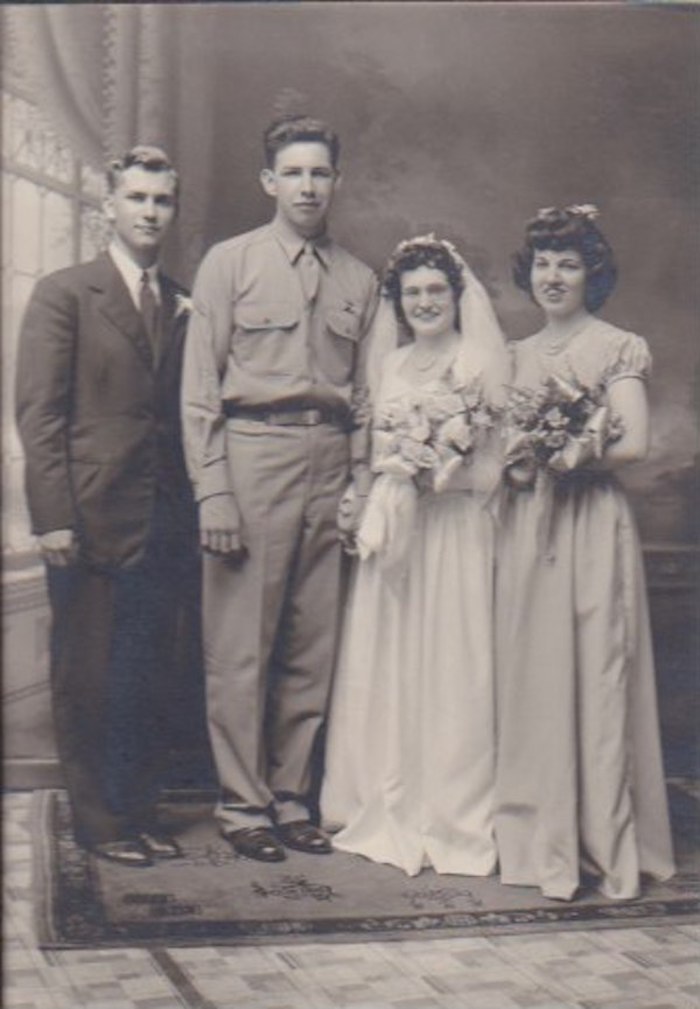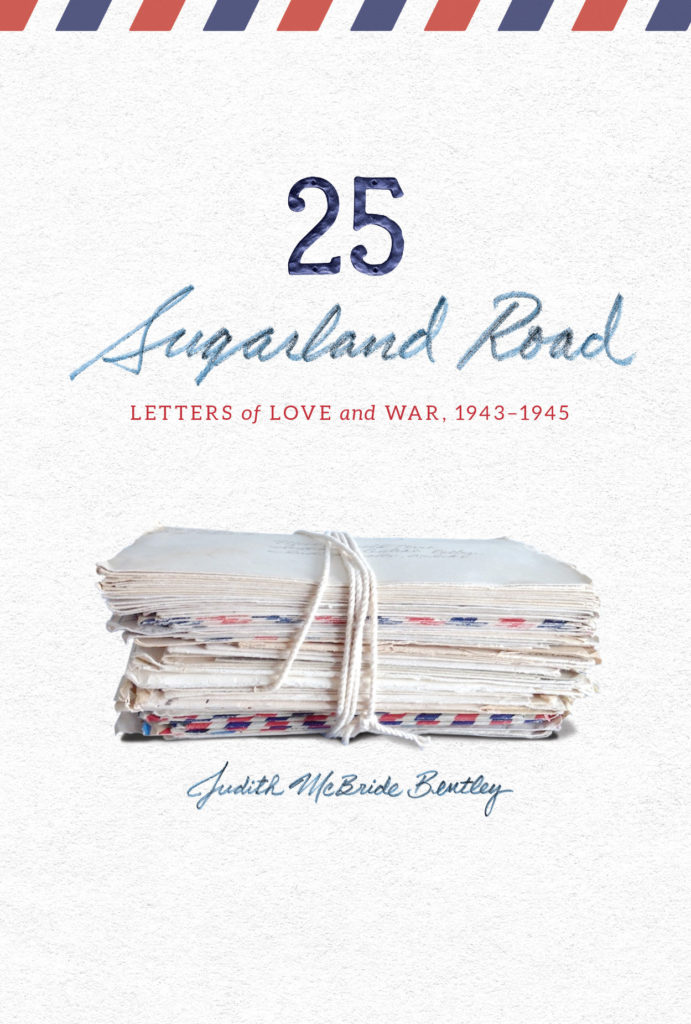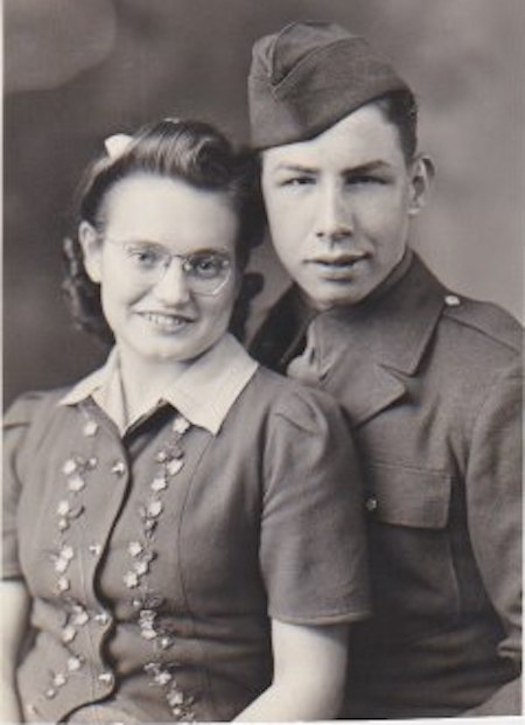
Purchase Tickets
25 Sugarland Road: Letters of Love and War, 1943–1945
March 8, 2021

Bob and Luella McBride had been married two months when twenty-year-old Bob was thrust into a global war as a medic with the Seventeenth Airborne Division, including becoming part of the last-gasp German offensive at the Battle of the Bulge. Luella Hart, nineteen when she married, relied on her sisters and Bob’s parents for support as a wartime single mother.
In 25 Sugarland Road: Letters of Love and War, 1943–1945, now available from the Indiana Historical Society Press, author Judy McBride Bentley tells her parents’ story through excerpts from more than 200 letters filled with wonder, anxiety, yearning, and a strong sense of family during a time their views of the world and human nature became shattered by the realities of war.
Bentley, a 1963 graduate of Indianapolis’s Emmerich Manual High School who today lives in Seattle, Washington, took some time to answer questions about her book.

How did you first come upon the letters from your parents during World War II?
My parents died a year apart, in 2008 and 2009. My brother, Ron McBride, who lived in Indianapolis, had received and stored many of their possessions when they moved into a retirement community in Franklin. After my mother’s funeral, my family gathered to sort through their mementoes and help Ron clear out his basement. We spread out quilts, silverware, embroidery pieces, and war memorabilia—a knife, a German luger, medals, insignia. We used a lottery system. We wrote down the items we most wanted, in order, and then we drew numbers for first choice and made our claims, one by one. When our lists were exhausted, there were a few items left—including a stack of airmail letters, curled around each other and tied with a shoestring. They were addressed to my mother from my father in England, France, and Germany during the war.
“Why don’t you take them, Judy,” one of my brothers said. “You’re the historian.” And so, I did.
I had never seen these letters. They looked like they hadn’t even been read since the 1940s. I was reluctant to intrude on my newlywed parents’ privacy, and I put them away in a chest in my home for several years.
Then another bunch of letters cropped up—I don’t remember from where—and they were letters from Indiana to my father—so there was a two-way correspondence.
I carefully untied the shoelace and started reading.

Photo courtesy of Judy McBride Bentley.
In going through the letters, what surprised you the most?
Well, I was relieved that there were no effusive outpourings of affection that would embarrass me. My parents were clearly newlyweds in love but fairly discreet.
I was surprised by the number of letters—more than 200—and who sent them, not just my mother and father but three grandparents, my mother’s sisters, my father’s brother, his aunts, his army buddies who were already home.
I was a bit surprised by the extent of the hatred toward the Japanese—my grandmother’s words about the atomic bomb. Some wartime features of Washington, Indiana, were new to me—the shirt factory turned parachute factory, the presence of German prisoners of war in southern Indiana. I was surprised by the desperation and near starvation of children in occupied Germany my father wrote about and the black market in selling watches to the Russians. I knew my father had been a paratrooper, but not a lot about how gliders worked. I knew an uncle of my father’s—who was younger than he was—had been killed flying over oil fields in Italy but not the horrible mortality rate of pilots and navigators on those flights.
I also realized in writing the epilogue what an advantage the GI Bill was for some soldiers in housing and college tuition after the war.
What inspired you to collect the letters in book form?
The voices in these letters were so strong—my father’s cockiness, my grandmother’s down-home diction, my mother’s weariness as a young mother separated for more than a year from her husband. My father had also written his memoirs, and they filled in a lot of the gaps in his military experience that he could not write in the letters, so that offered a narrative background.
I knew, too, that they got married on a three-day leave with a week’s planning, and they were very young when they got married, so I wanted to capture that drama. My father’s experiences as a paratrooper, medic, and in the occupation forces seemed noteworthy.
For me, it’s also a reclaiming of my Indiana heritage. I was sometimes embarrassed by my paternal grandmother and grandfather’s lack of education, by their humble origins, their speech patterns, their hardscrabble lives, and I was aware of the near-poverty my mother grew up in, a family of eight children. Their lives were much harder than mine has ever been, and I wanted to acknowledge that but show their resilience.
Had your father or mother talked much about their wartime experiences with you or other members of your family?
They talked very little about the wartime experiences, especially my father. He did not glorify war, nor did he brag about his wartime service. The two stories they both repeated were of kindness. At the time of giving birth, my mother was living with a sister’s family, and her brother-in-law just dropped her off, alone, at the door of the hospital. A very kind nurse kept her company during the birth, and she never forgot that.
The other experience Dad talked about was a brutal basic training episode in Tennessee when the soldiers were tired, wet, cold, pushed beyond their limits in a rainstorm, and they were told to take shelter wherever they could find it. A farm woman welcomed them into her home, with warm food, blankets, and shelter. Dad never forgot that kindness; his mother wrote to the woman, thanking her for her care.
So, the wartime experiences they talked about were of kindness. Only in reading my father’s memoirs did I find out what he had left out of his letters home.
What are you working on for your next writing project?
I just finished the second edition of Hiking Washington’s History, a guide to more than 40 historic trails in Washington State. As a transplant from Indiana to Seattle, I was awed by the mountain ranges, volcanoes, wild and scenic rivers, the Pacific Ocean, and desert-like plateaus and canyons. I hiked and wrote about trails that have been used for thousands of years.
Next, I’m working on a biography of Mary Richardson Walker, a missionary to the Spokane Indians in the 1840s in what became Oregon Territory. She left a remarkable diary. I do like communicating other people’s words and thoughts!









